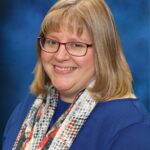This is the fifth in our series of remembrances on the late Susan Sell. There was a terrific gathering at ISA 2024 where friends and colleagues gathered to remember Susan’s wit, her contributions to the discipline, and her career-long efforts to challenge orthodox thinking and staid hierarchies.
I took my first Ph.D. class with Susan Sell at GW. She didn’t know it, but I was a “first generation” student, being the first one in my extended family to complete a college degree, let alone a Ph.D. From my very first day in her class, Susan was the exact opposite of those horrible Ph.D. advisor tropes. Her incredibly positive presence in my academic career served as a bulwark against the bullying, gaslighting and imposter-syndrome inducing experiences that so many academics deal with. For 25 years, she was always on my side, serving as a mentor and friend, enthusiastically. This is particularly amazing considering I didn’t even work in her field. I want to share just three examples of times when she changed my life with her generosity and warmth.
The first event took place after I successfully defended my dissertation proposal. I realised I didn’t want to focus that particular topic – and took time off from the Ph.D. program to work for the US government. I came back incredibly energized after a few years, wanting to do a completely different topic and needing new advisors. I went to Susan, who embraced me and encouraged me, instead of doubting my commitment to a Ph.D. She gave me strategic advice on how to convince two key academics to take me on as a student, despite having never taken a class with either of them! (Those two were, by the way, Marty Finnemore and Debbi Avant.)
Another time Susan intervened for me was after I published my book, based on my Ph.D. thesis. The book had done remarkably well, winning a book award and receiving multiple positive reviews. When taking part in an invited workshop on a related topic, I was publicly berated by a senior scholar for several minutes, as they detailed the problems that they had with my book. I tried to reply but the scholar simply talked over me. As an early career scholar, I was stunned and devastated, not only by being blindsided by harsh criticism from a senior person in my field, but also by the public humiliation in front of a group of colleagues with whom I had hoped to make connections and build collaborations.
Shortly afterward, I happened to speak with Susan, and I told her about my experience. Of course, she listened with empathy and outrage, as well as offered support and advice. But she did more than that. She rallied troops on my behalf, letting other people in my field know about what happened, who then also offered me support and help. Instead of feeling ashamed and alone, I felt supported and empowered. What could have been a career-altering incident instead became just a bump on the road, because Susan listened, cared, and acted.
A final example of how Susan shaped my career happened more recently. During one of our meetups in Canberra after she moved to Australian National University, I shared concerns about the lack of diversity and inclusion in security studies, from demographic diversity to gatekeeping in publishing. She got a flash in her eye, and she began pulling papers out from around her delightfully chaotic office. We ended up spending over an hour as she gathered resources for me – people I needed to connect with, articles that would help me, publishers I should consider, and more. She didn’t question my diversion from my main research agenda on nuclear politics; instead, she enthusiastically reached into her deep networks and knowledge to help.
These are just a few examples of many over the years that I could give of the acceptance, support and wise counsel that Susan always joyfully radiated. I know that I am not alone that she enriched the entire field of international relations, and also when I say I will miss her as a mentor and friend.


0 Comments